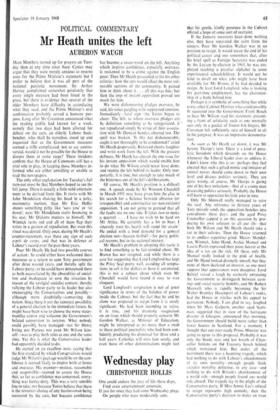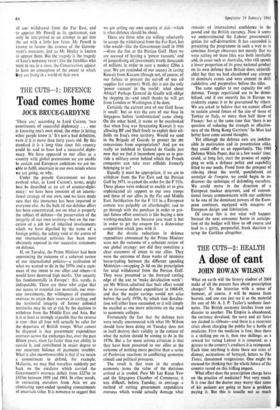Mr Heath unites the left
POLITICAL COMMENTARY AUBERON WAUGH
More Members turned up for prayers on Tues- day than at any time since Suez. Cynics may argue that they were merely anxious to reserve seats for the Prime Minister's statement but I prefer to believe that it was all part of the national patriotic movement. Sir Arthur Harvey complained somewhat petulantly that every single measure had been listed in the press, but-there is evidence that several of the older Members have difficulty in assimilating what they read, and the Prime Minister's' oral confirmation probably served a humane pur- pose. Long after Mr Crossman announced what the reading public had known for a week, namely that two days had been allotted for debate on the cuts, an elderly Labour back- bencher, who shall be nameless, stood up and requested that as the Government measures seemed a trifle complicated, not to say contro- versial, would it not be possible for the House to discuss them at some stage? These incidents confirm that the House of Commons still has a vital role to play, in keeping those Members in- formed who are either unwilling or unable to read the newspapers.
The only other explanation for Tuesday's full turn-out must be that Members hoped to see the left jump. There is usually a little mild entertain- ment to be derived from this. It starts with Mr John Mendelson shaking his head in a jerky, marionette motion; then Mr Eric Heifer shouts something pithy like `says you' or 'sit down'; next Mr Mendelson starts bouncing in his seat, Mr Dickens mutters to _himself, Mr "Winnick turns red and all of them flap their wrists in a gesture of repudiation. But even this ritual was denied. Only once, during Mr Heath's counter-statement, was there any sign of such esprit de corps, and that was in defence of Labour's record over the past three years.
Poor Mr Heath. He had two possible courses of action: he could either have welcomed these measures as a return to sane Tory government after three wasted years, and thereby split the Labour party; or be could have denounced them as both necessitated by the absurdities of social- ism and inadequate to save the situation by reason of the vestigial socialist content, thereby rallying the Labour party to its leader but also encouraging the Conservatives and possibly— although more doubtfully—converting the nation. Since there is not the remotest possibility of a general election in the immediate future, he might have been wise to choose the more states- manlike course and welcome the Government's belated conversion to toryism. What nobody could possibly have managed—not Sir Henry Irving nor Proteus nor even Mt Wilson him- self—was to play both roles at one and the same time. Yet this is what the Conservative leader had apparently decided to do.
He started on an excellent note, saying that the first standard by which Conservatives would judge Mr Wilson's package would be on the con- fidence it seemed likely to inspire both at home and overseas. His manner—mature, reasonable and responsible—seemed to assure the House thit, so far as confidence was concerned, every- thing was hunky-dory. This was a. very sensible line to take, not because Tories believe that there is the remotest chance of any businessman being reassured by the cuts, but because confidence has become a swear-word on the left. Anything which inspires confidence, especially overseas, is reckoned to be a crime against the English poor. Then Mr Heath proceeded to list his other criteria: how the cuts would affect the most vul- nerable sections of the community. It pained him to think about it . . . all this was fine; but then the imp of instant opposition proved too much for him.
We were dishonouring pledges overseas, he said, his voice gurgling with suppressed emotion. Immediately—fatal sign—the Tories began to cheer. The left, to whom overseas pledges are by definition something to be renegotiated, if not repudiated simply by virtue of their associa- tion with Mr Duncan Sands, cheered too. The spell was broken. 'Is this not dishonourable, ought it not thoroughly to be condemned?' cried Mr Heath desperately. Renewed cheers, laughter and wrist work from the left. With the greatest deftness, Mr Heath has chosen the one issue for his instant opposition which would enable him to do what Mr Wilson could never have done, and reunite the left behind its leader. Only tem- porarily, it is true, but enough to take much of the bitterness out of the left's deliberations.
Of course, Mr Heath's position is a difficult one. A speech made by Sir Winston Churchill in March 1951 may have given him the clue in his search for a balance between abrasive (or irresponsible) and constructive (or non-existent) opposition. 'I am not going to pretend that all the faults are on one side. It takes two to make a quarrel. . . . I have no wish to be hard on Mr Attlee. He certainly has a lot to bear. I sincerely trust his health will stand the strain.' He ended with a loud demand for a general election not—heaven forbid ! —for party politi- cal reasons, but in the national interest.
Mr Heath's problem in adopting this tactic is to find something to be fair-minded about. Mr Brown has not resigned, and while there is a case for suggesting that Lord Longford has kept the Privy Seal pretty well, avoiding all tempta- tions to sell it for dollars or have it automated, this is not a subject about which even Mr Churchill would have found it easy to wax eloquent.
Lord Longford's resignation is not of great significance in terms of the balance of power inside the Cabinet. but the fact that he and he alone was prepared to resien from it is surely significant.' He had been intending to retire, it is true, and his dramatic resignation on an issue which should properly concern Mr Gordon Walker, as Minister of Education, might be interpreted as no more than a snub to those political journalists who had been con- fidently predicting his dismissal for three and a half years. Catholics will miss him sorely, and even those of other denominations might feel that his gentle, kindly presence in the Cabinet offered a hope of some sort of restraint.
If the January measures haw-done nothing else, they have separated the saint from the sinners. Poor Mr Gordon Walker was in no position to resign. It would mean the end of his political career and one remembers that, after his brief spell as Foreign Secretary was ended by the Leyton by-election in 1965, he was em- ployed teaching a peculiar alphabet to some experimental schoolchildren. It would not be kind to dwell on what jobs might have been available for Mr Brown, if he had decided to resign. At least Lord Longford, who is looking for part-time employment, has the chairman- ship of a bank behind him.
Perhaps it is symbolic of something that while every other Cabinet Minister who could possibly fit squeezed into the Government Front Bench to hear Mr Wilson read his statement, present- ing a front of solidarity such as one normally sees only in a packet of frozen fish fingers, Mr Crossman felt sufficiently sure of himself to sit in the gangway. It was an impressive demonstra- tion.
As soon as Mr Heath sat down, it was Mr Jeremy Thorpe's turn. There is a kind of para- lytic boredom which descends on the House whenever the Liberal leader rises to address it. I don't know why this is so—perhaps they feel cheated that such a gifted mimic and imitator of animal noises should come down to their own level and discuss politics seriously. They are quite wrong, of course, Mr Thorpe is giving one of his best imitations—that of a young man discussing politics seriously. Probably the House will learn to appreciate his little joke in time.
Only Mr Shinwell really managed to raise the roof. Any reference to thirteen years of Tory misrule sends the opposition benches into convulsions these days, and the aged Privy Counsellor capped it on this occasion by pro- ducing his own solution to all our ills—that both Mr Wilson and Mr Heath should take a cut in their salaries. Then the House returned to its endless repetitive grind. Messrs Mendel- son, Winnick, John Hynd, Archie Manuel and Laurie Pavitt expressed their pious horror at the idea of a tax on the sick. Of these, only Mr Manuel really looked in the pink of health, and Mr Hynd looked distinctly unwell, but they none of them declared an interest, so one must suppose that appearances were deceptive. Lord Balniel raised a laugh by earnestly entreating the Government to distinguish between earn- ings and social security benefits, and Mr Robert Maxwell, who is rapidly becoming the Sir Walter Bromley Davenport of Labour's ranks, had the House in stitches with his appeal to patriotism. Nobody, I am glad to say, laughed when Sir Myer Galpern, another aged Scots- man, suggested that in view of the hurricane disaster in Glasgow, announced that morning, the Government should build more rather than fewer houses in Scotland. For a moment, I thought that our ever-ready Prime Minister was going to agree to this proposal. Probably it was only the beady eyes and hot breath of Chan- cellor Jenkins on the Treasury bench behind which restrained him. But under all the merriment there was a haunting tragedy, which had nothing to do with Labour's abandonment of its own morality—enough people think socialist morality defective, in any case—and nothing to do with Britain's abandonment of a world role—enough people found our• world role absurd. The tragedy lay in the plight of the Conservative party. If Miss Jennie Lee's refusal to resign represents high comedy, then the Conservative party's decision to make an issue of our withdrawal from the Far East, and to appoint Mr Powell as its spokesman, can only be interpreted as an attempt to get into the act with a little low farce. Mr Powell is known to favour the essence of the Govern- ment's measures, just as Mr Healey is known to oppose them. But the tragedy is the tragedy of Lear's nonsense verse: like the Jumblies who went to sea in a sieve, the Conservatives appear to have no conception of the extent to which *ley are living in a world of their own.



































 Previous page
Previous page